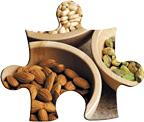|
Everyone knows vitamins are, well, vital to good health, but meeting the daily minimum requirements, much less the optimal amounts to maximize health and wellness, can be a struggle. Let's review seven of the most important vitamins and learn how to make sure these and other micronutrients are staples of your daily diet.
When it comes to daily vitamin requirements, a number of essential vitamins are recommended to maintain overall health and well-being. When you feed your body with adequate levels of these essential nutrients through diet and/or supplementation, you promote vitality, contribute to longevity and help prevent disease. Here is an overview of seven key vitamins that offer support for a number of critical body functions and help promote total-body health and wellness.
The dosages listed below include Recommended Dietary Allowances (RDA) as set by the Food and Drug Administration; however, be aware that they represent the minimum daily amounts required to avoid serious deficiency of each nutrient. For many nutrients, the therapeutic dosages necessary to achieve optimal health and avoid illness are much higher, but the toxicity levels for many of these nutrients must also be kept in mind. Therefore, it is always advisable to consult with your health care providerbefore starting any nutritional program, particularly if it involves increasing your intake of specific nutrients.
Vitamin A
 Vitamin A plays an important role in vision, bone growth, reproduction, and cell division. Adequate amounts of vitamin A help to regulate the immune system and protect against infections by producing the white blood cells that destroy harmful bacteria and viruses. Vitamin A is known to be beneficial for eye health, as it is absorbed in the form of retinol, which is one of the most active forms of vitamin A that produces pigments in the retina of the eye and helps promote good vision. This type of vitamin A is found in foods such as eggs, milk and liver. Vitamin A plays an important role in vision, bone growth, reproduction, and cell division. Adequate amounts of vitamin A help to regulate the immune system and protect against infections by producing the white blood cells that destroy harmful bacteria and viruses. Vitamin A is known to be beneficial for eye health, as it is absorbed in the form of retinol, which is one of the most active forms of vitamin A that produces pigments in the retina of the eye and helps promote good vision. This type of vitamin A is found in foods such as eggs, milk and liver.
Another type of vitamin A is called a carotenoid, which is found in plant-based foods and includes beta-carotene, alpha-carotene and beta-cryptoxanthin. These forms of vitamin A can offer protection against cataracts, macular degeneration, cardiovascular problems, and other health conditions associated with oxidative damage. In addition to serving as powerful antioxidants, carotenoids promote the growth of healthy cells, while inhibiting the growth of unhealthy ones. A common dosage for vitamin A is 2,500 IUs a day, with additional 2,500-7,500 IUs a day as beta-carotene. In rare cases, high levels of vitamin A can cause toxicity, and is therefore no longer given at high dosages such as 100,000 IUs a day on a long-term basis.
Dietary sources: Carrots, sweet potatoes, pumpkin, eggs, milk.
Vitamin B12
 Another valuable vitamin for overall well being is vitamin B12, which helps the body make healthy blood cells and maintains a healthy nervous system and brain function. Vitamin B12 is often found in supplements that are combined with other B vitamins in a vitamin B complex formulation, but is also rich in animal food products such as meat, shellfish, milk, cheese, and eggs. When part of a healthy diet, vitamin B12 not only contributes to healthy blood cell formation, but also helps maintain healthy nerve cells and DNA. Since the body is able to store vitamin B12 over time, nutritional deficiency of this particular vitamin is rare, but elderly individuals and strict vegetarians whose diets are lacking animal products are at the highest risk of developing a deficiency. Another valuable vitamin for overall well being is vitamin B12, which helps the body make healthy blood cells and maintains a healthy nervous system and brain function. Vitamin B12 is often found in supplements that are combined with other B vitamins in a vitamin B complex formulation, but is also rich in animal food products such as meat, shellfish, milk, cheese, and eggs. When part of a healthy diet, vitamin B12 not only contributes to healthy blood cell formation, but also helps maintain healthy nerve cells and DNA. Since the body is able to store vitamin B12 over time, nutritional deficiency of this particular vitamin is rare, but elderly individuals and strict vegetarians whose diets are lacking animal products are at the highest risk of developing a deficiency.
Vitamin B12 is one of the most under-dosed vitamins, but as a water-soluble vitamin, it is very safe. Adults need at least 2.4 micrograms of vitamin B12 on a daily basis, but up to 5 mg a day of the vitamin can be taken orally. It is often used in injections, chronic pain, fatigue, neuropathies, jet lag and other common ailments. There are two common forms of B12, cyianocobalamine and methylcobalamine. While both forms offer a range of health benefits, methylcobalamine is preferred for treating central nervous system symptoms.
Dietary sources: Fish, meat, poultry, eggs, milk, and milk products.
Vitamin B6
 Another of the B complex vitamins that has profound health benefits is vitamin B6 or pyridoxamine. This essential nutrient facilitates coenzyme activities, helps to maintain a healthy immune system, and provides protection against conditions such as heart disease, multiple sclerosis, anemia, arthritis, and influenza, among others. Vitamin B6 is found in a variety of foods, including whole grains, walnuts, eggs, meat, bananas, cauliflower, cabbage, carrots, and spinach. The vitamin effectively works together with a number of enzyme systems in the body to promote proper functioning of the nervous system. Another of the B complex vitamins that has profound health benefits is vitamin B6 or pyridoxamine. This essential nutrient facilitates coenzyme activities, helps to maintain a healthy immune system, and provides protection against conditions such as heart disease, multiple sclerosis, anemia, arthritis, and influenza, among others. Vitamin B6 is found in a variety of foods, including whole grains, walnuts, eggs, meat, bananas, cauliflower, cabbage, carrots, and spinach. The vitamin effectively works together with a number of enzyme systems in the body to promote proper functioning of the nervous system.
Additionally, vitamin B6 plays an important role in restoring the immune system, helping to prevent and protect against damage from infections. Perhaps one of the most significant benefits of vitamin B6 is its ability to promote healthy skin. It helps protect against the development of eczema, dandruff, acne, hair loss, and dry skin. Even further, it helps in treating serious skin diseases such as melanoma and psoriasis. The recommended daily allowance for vitamin B6is 1.3 mg, but up to 50-100 mg a day are commonly and safely taken as a therapeutic dose.
Dietary sources: Beans, meat, poultry, fish, walnuts, some fruits and vegetables (e.g., bananas, cauliflower, spinach).
Vitamin C
 As you probably already know, a daily dose of vitamin C is one of your easiest and most effective weapons against illness. Vitamin C protects the body with its powerful antioxidant properties and has a significant impact on the state of your health. Most commercial multivitamin supplements contain both vitamin C and zinc, which is another important antioxidant that supports your thymus gland and helps to promote immune function. Vitamin C's profound ability to protect cells from free radical damage can help lower your risk of various diseases and conditions, while improving iron absorption to promote healthy blood cells. Excellent food sources of vitamin C include broccoli, bell peppers, kale, cauliflower, strawberries, spinach, oranges, grapefruit, and tomatoes, and the recommended daily allowance is 1,000-2,000 mg a day. Dosages as high as 50-100 grams of vitamin C can be used intravenously under the supervision of a doctor for detoxification, to help chronic inflammation and as part of integrative cancer care. As you probably already know, a daily dose of vitamin C is one of your easiest and most effective weapons against illness. Vitamin C protects the body with its powerful antioxidant properties and has a significant impact on the state of your health. Most commercial multivitamin supplements contain both vitamin C and zinc, which is another important antioxidant that supports your thymus gland and helps to promote immune function. Vitamin C's profound ability to protect cells from free radical damage can help lower your risk of various diseases and conditions, while improving iron absorption to promote healthy blood cells. Excellent food sources of vitamin C include broccoli, bell peppers, kale, cauliflower, strawberries, spinach, oranges, grapefruit, and tomatoes, and the recommended daily allowance is 1,000-2,000 mg a day. Dosages as high as 50-100 grams of vitamin C can be used intravenously under the supervision of a doctor for detoxification, to help chronic inflammation and as part of integrative cancer care.
Dietary sources: Fruits and vegetables, particularly cantaloupe, citrus fruits, berries, broccoli, green and red peppers, tomatoes and winter squash.
Vitamin D

Vitamin D is actually a hormone the body creates naturally from diet and sunlight, and more and more research is showing just how important it is for growth and development. It is vital for maintaining a strong immune system, regulating inflammation, assisting in calcium absorption, and decreasing the risk of chronic diseases.
There are two main types of vitamin D: vitamin D2 (ergocalciferol), which is available from plants and vitamin D3 (cholecalciferol), which is created from exposure to the sun's ultraviolet-B (UVB) rays. The kidneys are responsible for turning both forms into calcitrol, which is the active form of the vitamin that the body can use.
Since vitamin D promotes calcium absorption and enables normal mineralization of bone, it is needed for healthy bone growth and remodeling. Without sufficient vitamin D, bones can become thin, brittle or misshapen, leading to the development of rickets in children and osteoporosis in older adults.
To obtain adequate levels of vitamin D and prevent such conditions, the recommended daily allowance for adults is 1,000 IUs, but a therapeutic dose for immune health and cancer prevention is much higher. The importance of vitamin D3 has hit "mainstream medicine" and doctors are routinely testing for D3 levels. At my clinic, we've observed that it might take as much as 10,000 IUs a day to increase blood levels when low, and about 5,000 IUs a day to maintain them. It is also important to regularly check kidney function, as in rare occasions, vitamin D in high dosages can adversely affect the kidneys.
Dietary sources: Fatty fish, cheese, egg yolks, fortified foods.
Vitamin E
 Another valuable vitamin for overall health is vitamin E, which effectively helps to prevent blockages in the coronary arteries. Additionally, vitamin E acts as a powerful antioxidant and anti-inflammatory agent to protect the liver, which can metabolize and excrete some forms of vitamin E. Antioxidants such as vitamin E effectively protect cells from free-radical damage, which contribute to the development of cardiovascular disease and other serious health conditions. Another valuable vitamin for overall health is vitamin E, which effectively helps to prevent blockages in the coronary arteries. Additionally, vitamin E acts as a powerful antioxidant and anti-inflammatory agent to protect the liver, which can metabolize and excrete some forms of vitamin E. Antioxidants such as vitamin E effectively protect cells from free-radical damage, which contribute to the development of cardiovascular disease and other serious health conditions.
There are several types of natural, food-based vitamin E supplements available, including alpha-, beta-, gamma- and delta-tocopherol, so it is important to ensure that your supplement includes all these fractions. Foods that are naturally high in vitamin E include almonds, walnuts, peanuts, pistachios, and hazelnuts, and the recommended daily allowance for adults is 15 milligrams. The therapeutic dosage is 200-400 mg a day of mixed tocopherols.
Dietary sources: Nuts, seeds, vegetables oils (soybean, canola, etc.), green leafy vegetables.
Vitamin K
 Vitamin K is one of those vitamins that you don't hear a lot about in the media or the doctor's office, but it is an important nutrient for heart and bone health. There are two natural forms utilized by the body: vitamin K1 and K2. Vitamin K1 is used for blood coagulation, while K2, which is mostly found in meat, liver, cheese, and egg yolks, is used for calcium regulation. Both forms of the vitamin work together to prevent cardiovascular disease, as K2 controls calcification in your arteries and K1 helps to thin the blood. Vitamin K is one of those vitamins that you don't hear a lot about in the media or the doctor's office, but it is an important nutrient for heart and bone health. There are two natural forms utilized by the body: vitamin K1 and K2. Vitamin K1 is used for blood coagulation, while K2, which is mostly found in meat, liver, cheese, and egg yolks, is used for calcium regulation. Both forms of the vitamin work together to prevent cardiovascular disease, as K2 controls calcification in your arteries and K1 helps to thin the blood.
Calcification of the arteries is a form of cardiovascular degeneration that can begin at an early age but usually goes unnoticed until more serious problems arise. K2 helps prevent this process by deciding where calcium gets delivered in the body and ensures that the calcium you consume is deposited in your bones, not in your blood vessels and other soft tissues. K2 also helps promote blood vessel elasticity by safeguarding elastin, the core protein in the muscle fibers primarily responsible for the elasticity of the arterial wall. For these reasons, vitamin K is an important nutrient for overall health; the recommended daily allowance for adults is about 1 mg a day.
Dietary sources: Vegetables (e.g., spinach, asparagus, and broccoli), beans (including soybeans), strawberries, eggs, meat.
 While all these vitamins are required in adequate amounts for optimal health and well being, certain vitamins may be needed in higher amounts at different times, depending on your lifestyle, diet, environment, and possible deficiencies. Since the body cannot synthesize or manufacture most vitamins itself, these nutrients must be supplied directly through a proper whole foods diet with additional nutritional supplementation. Obtaining recommended amounts of all these vitamins will promote overall well-being by helping to boost energy, regulate the body's systems, balance metabolism, enhance immune function, assist in the formation of bones and tissue, and help convert fat and carbohydrates into usable energy. Remember to talk to your health care provider if you are considering taking any of these vitamins as supplements so they can recommend an appropriate dosage. While all these vitamins are required in adequate amounts for optimal health and well being, certain vitamins may be needed in higher amounts at different times, depending on your lifestyle, diet, environment, and possible deficiencies. Since the body cannot synthesize or manufacture most vitamins itself, these nutrients must be supplied directly through a proper whole foods diet with additional nutritional supplementation. Obtaining recommended amounts of all these vitamins will promote overall well-being by helping to boost energy, regulate the body's systems, balance metabolism, enhance immune function, assist in the formation of bones and tissue, and help convert fat and carbohydrates into usable energy. Remember to talk to your health care provider if you are considering taking any of these vitamins as supplements so they can recommend an appropriate dosage.
IsaAc Eliaz, MD, LAc, MS, has been practicing integrative, holistic medicine for more than 25 years. He is the medical director of Amitabha Medical Clinic and Healing Center in Sebastopol, Calif., where integrative health practitioners work with patients to treat cancer and other chronic illness. Learn more at www.dreliaz.org.
|


 Another valuable vitamin for overall well being is
Another valuable vitamin for overall well being is  Another of the
Another of the  As you probably already know, a daily dose of
As you probably already know, a daily dose of 
 Another valuable vitamin for overall health is
Another valuable vitamin for overall health is  Vitamin K is one of those vitamins that you don't hear a lot about in the media or the doctor's office, but it is an important nutrient for heart and bone health. There are two natural forms utilized by the body: vitamin K1 and K2. Vitamin K1 is used for blood coagulation, while K2, which is mostly found in meat, liver, cheese, and egg yolks, is used for calcium regulation. Both forms of the vitamin work together to prevent cardiovascular disease, as K2 controls calcification in your arteries and K1 helps to thin the blood.
Vitamin K is one of those vitamins that you don't hear a lot about in the media or the doctor's office, but it is an important nutrient for heart and bone health. There are two natural forms utilized by the body: vitamin K1 and K2. Vitamin K1 is used for blood coagulation, while K2, which is mostly found in meat, liver, cheese, and egg yolks, is used for calcium regulation. Both forms of the vitamin work together to prevent cardiovascular disease, as K2 controls calcification in your arteries and K1 helps to thin the blood.